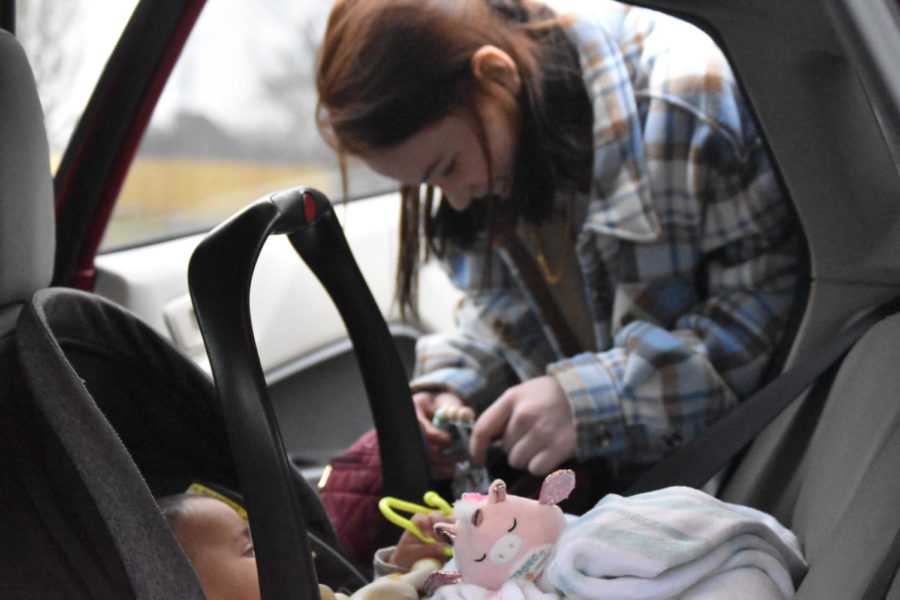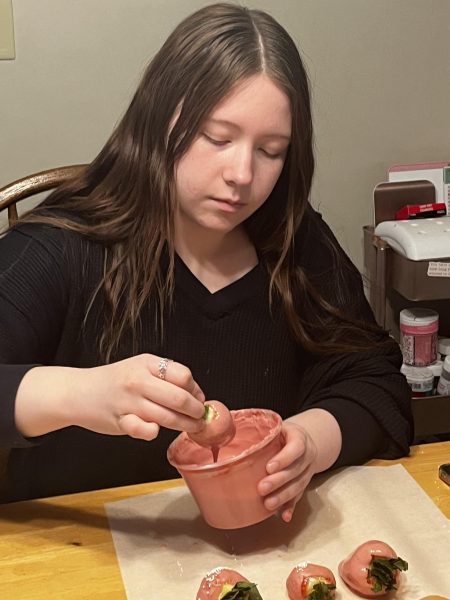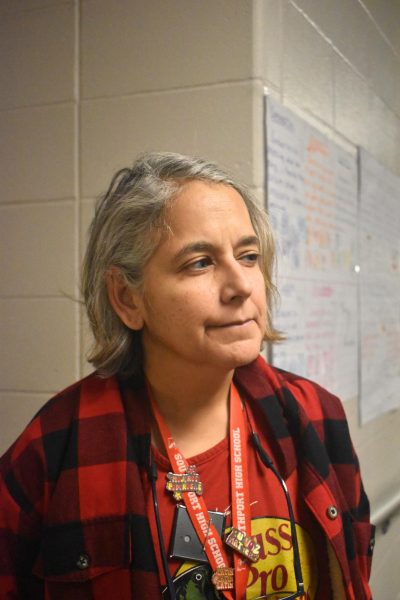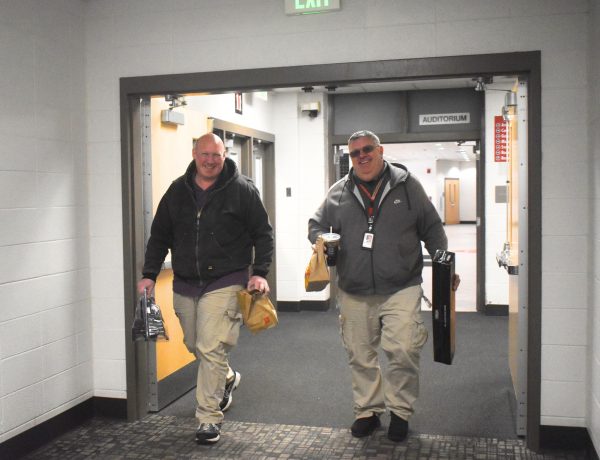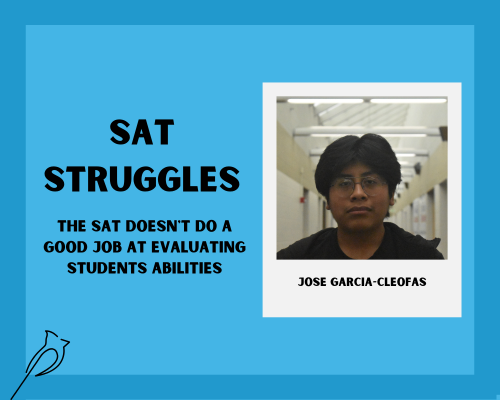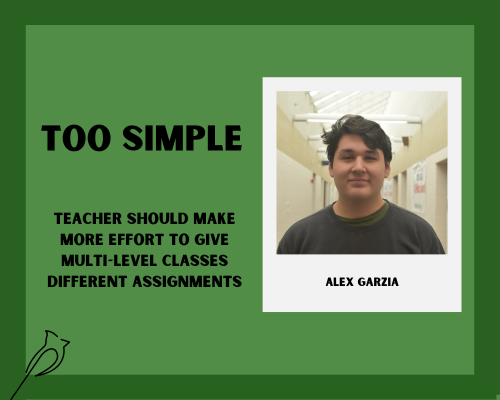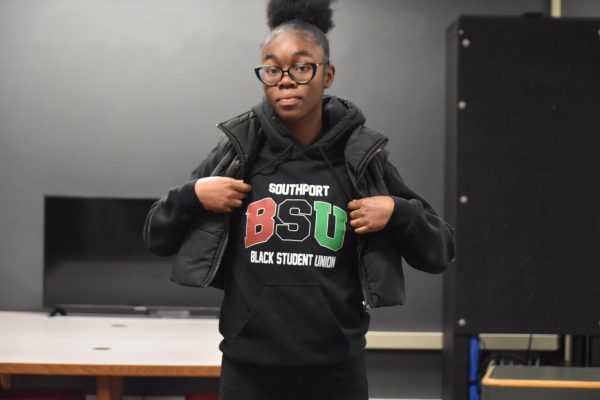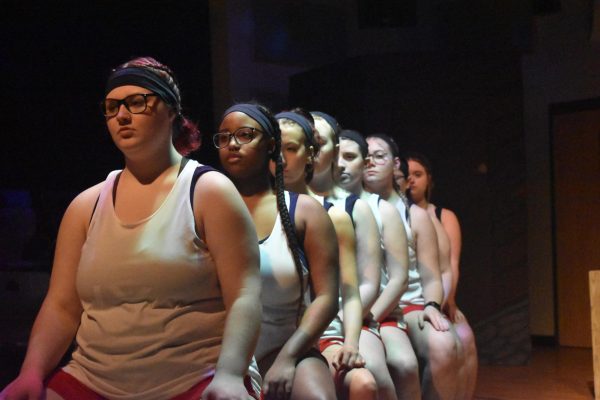Facing the positive
SHS teen moms encounter many obstacles in their academic and personal lives
Former SHS student Brooklyn Ritter picks out toys for her baby Montéa to have in the car on Dec 15. She had picked up her daughter from the babysitter earlier.
A 15-year-old girl lay on a hospital bed, unaware that her life was about to change forever.
Although the girl, former SHS student Brooklyn Ritter, already suspected something was amiss, she wasn’t prepared for what the doctors were about to tell her — something that two negative pregnancy tests couldn’t predict.
Ritter, the doctors told her, was eight weeks pregnant.
“It was just unreal,” Ritter said.
Ritter is just one of many teenagers whose life was changed by her teen pregnancy. Although the number is declining, the U.S. teen birth rate is still significantly higher than in other Western countries, and of all girls in the U.S., 16% will be teen mothers.
These teen mothers face many challenges, and their lives are permanently changed.
Spreading the news
After Ritter came home from the hospital, she told her mother the news. Ritter felt that she was very disappointed, as well as mad. Her mother’s boyfriend held the same feelings, and some harsh things were said. But, after some time, he and her mother came around. Ritter’s mother immediately made her promise to never lose sight of what’s important.
“But the first thing that she made me promise her was that I would never give up on my dreams, and my school,” Ritter said. “So, I did not.”
After finding out she was pregnant, Ritter’s friends remained supportive although most drifted away. This was not due to her pregnancy but because of the loss of understanding between them.
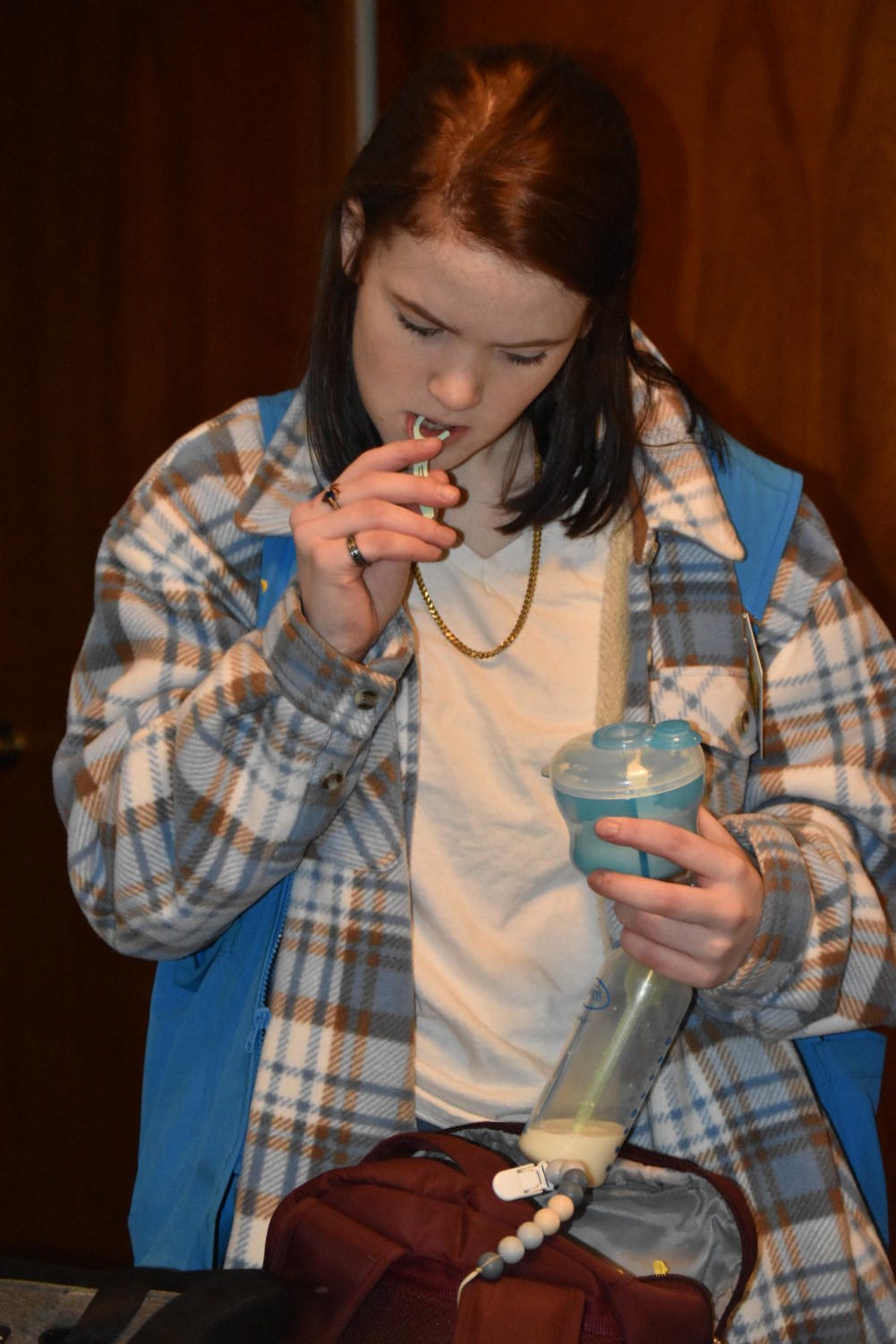
“I definitely lost some friends … not (because of) the fact that I was pregnant, just because I don’t really relate to them in any way,” Ritter said. “And they don’t relate to me.”
Like Ritter, SHS graduate and teen mother Kayla Kinnaman had an unconventional process of finding out she was pregnant.
Kinnaman and her cousin were messing around, and each took a pregnancy test for fun. What they didn’t expect was that while her cousin’s was negative, Kinnaman’s came back positive.
“I had no symptoms or anything,” Kinnaman said. “I didn’t even think for the slightest that I was pregnant.”
For the next two months, Kinnaman didn’t tell anyone. Eventually, though, her family, as well as the father’s family, found out. They soon got over their slight disappointment and became excited, providing helping hands throughout Kinnaman’s entire experience.
SHS graduate and teen mother Alexes Howson experienced a reaction from her family similar to Kinnaman’s.
Her family had said she was acting strange, so she took a test. It, of course, came back positive. Initially, Howson was very, very nervous but soon became excited for her son to arrive.
“Afterwards, it was just easygoing, and I was pretty happy,” Howson said.
Her family was disappointed, as she was so young, but supportive. Her mother in particular was there every step of the way, as was her boyfriend and other family members.
Although each of these teen mothers’ families were supportive, their concern for their children may be justified. According to the nonprofit organization DoSomething, more than half of all mothers on welfare are teenage mothers. Additionally, the American Pregnancy Association says that pregnant teenagers, especially those who do not seek prenatal care, may be in danger of nutrient deficiency, high blood pressure and anemia. They also have a higher risk of giving birth prematurely.
This concern is nothing new to Spanish teacher Christine Posadas. Ten years ago, her daughter got pregnant as a 19-year-old college student. Even though she was continuously supportive of her daughter during this time, her first reaction was not so accepting. She was shocked, as well as disappointed, because this wasn’t the life she had envisioned for her daughter.
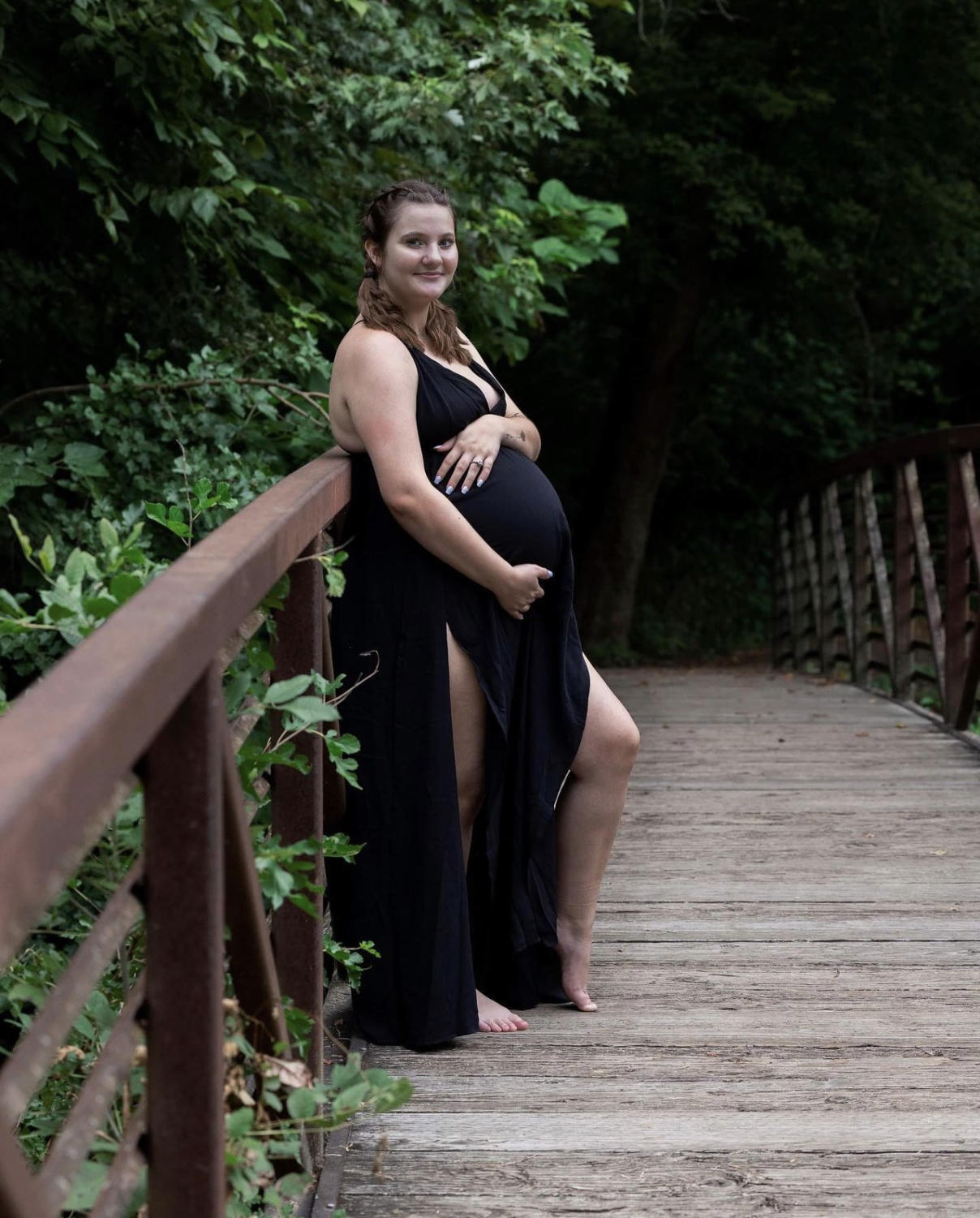
“I think I was just worried that she had made a choice that was going to affect the rest of her life, and she was still in college,” Posadas said.
But after about a day of processing, she came to the conclusion that this was meant to happen. Soon, she became excited for the baby to come.
“Once I realized that it was God’s plan, then I was okay with it,” Posadas said. “But that took me a day to process.”
Posadas believes that if anything, her daughter’s pregnancy made their relationship better. While pregnant, her daughter stayed in college but lived at home. After the baby was born, they continued to live with Posadas for the first four years of his life.
“I think it made us a lot closer because she was more dependent on me to help with the baby, so oftentimes, we would just figure it out together,” Posadas said.
Struggles developing
Even with the support of family, it hasn’t always been easy for these teen mothers.
For Ritter, becoming a mother changed her life immensely. She has dealt with many challenges, including struggles with her mental and physical health. Becoming pregnant, she says, made her depression and anxiety worse.
Ritter is not alone in this battle with her mental health. According to a study published in the Journal of Adolescent Health, two out of three mothers aged 21 and younger are diagnosed with at least one mental health problem after their child is born.
Aside from her mental struggles, Ritter’s pregnancy also took a toll on her physical health. She suffers with fibromyalgia, which during her pregnancy, amplified the already-present pain. Fibromyalgia, a chronic disorder which affects neurons in the brain, causes widespread pain throughout the body, as well as fatigue and memory issues.
“There would be moments where I would have episodes where I would just be screaming in pain for two hours straight,” Ritter said.
Another challenge Ritter faced, and still faces, was becoming a single mother. The choice to raise her daughter Montéa on her own was not an easy decision, and she must now manage raising her, on top of other responsibilities, without that support.
“It is definitely a hard decision to make, and I had a choice not to do it alone, but if I were not to do it alone … it would just not be a healthy relationship to be in,” Ritter said.
Kinnaman also dealt with challenges during her pregnancy, as well as after. Since she gave birth to her daughter Skylar at 16 years old, her teenage years were cut short by her pregnancy, although she wasn’t affected largely by this.
“I couldn’t do the normal teenage thing, but I wouldn’t trade it for anything, honestly,” Kinnaman said.
Now that she has graduated, attempting to find babysitters for Skylar has become difficult. The expense of having a child in general is something she had to realize.
“It’s expensive,” Kinnaman said. “It’s not cheap at all.”
Kinnaman is right. In fact, from a child’s birth to the time they turn 18, their family will spend an average of $17,000 on them each year. To cover the expenses, both Kinnaman and Skylar’s dad work. Although Kinnaman’s job is not the biggest part of her life, it does play a role in her responsibilities.
Howson also felt the responsibility of balancing motherhood, a job and student obligations. She knew that doing all of this would be impossible, so for a time, she considered switching to online school. Instead, she ended up graduating as a junior, an entire year early.
Although this was the best decision for Howson, she sometimes regrets it.
“I’m really glad to be out of school, (but) sometimes I miss my friends and dances and all the events,” Howson said.
Back in the halls
While school was the biggest obstacle Howson faced, the challenges that came with it affected Ritter and Kinnaman as well.
For Ritter, becoming a mother meant her time in typical high school had ended. After going to SHS for two years, she transferred to a public online school. Even though it is online, school is still much harder with a 7 month old to take care of.
For Kinnaman, school was a different experience entirely. Since she gave birth in February of 2020, she was caring for a newborn while also dealing with the COVID-19 pandemic. In some ways, this was good, as the school’s hybrid schedule meant she was able to spend more time with Skylar. On the other hand, trying to get schoolwork done with a newborn was a struggle.
This is a challenge Kinnaman would decide to endure throughout the rest of high school, continuing to attend school while pregnant and even returning after giving birth, which is a decision she does not regret at all.
SHS graduate and teen mother Adela Teles shared the desire to continue her education, despite carrying a baby. She gave birth in 2015 as a 16-year-old and attended SHS while she was pregnant. Like Kinnaman, she came back after giving birth.
“One of my goals was to finish high school, and I didn’t think that just because I was pregnant that meant that I didn’t get to stop attending school,” Teles said.
Although Teles remained at SHS all four years, it wasn’t an easy decision. After her son Ulises was born, she wanted to prioritize staying at home and caring for her baby. This wasn’t possible, though, as Teles was determined to commit to her schooling.
And commit herself she did. Throughout her entire experience, Teles kept above-average grades, though this too did not come without great difficulty.
“When my son was born, he was a good baby, but there were some nights where he got sick,” Teles said. “Then I didn’t have enough sleep, so it was hard to stay focused and awake during class.”
Teles was able to manage her schooling with help from her grandma, who watched Ulises while Teles was at school. Her son’s father also provided a lot of support.
 While Teles, Kinnaman and Howson were able to graduate from high school, they are representatives of the minority. According to the CDC, only about 50% of teen mothers receive a high school diploma by the age of 22. By comparison, about 90% of women who are not teen mothers graduate from high school.
While Teles, Kinnaman and Howson were able to graduate from high school, they are representatives of the minority. According to the CDC, only about 50% of teen mothers receive a high school diploma by the age of 22. By comparison, about 90% of women who are not teen mothers graduate from high school.
‘Love of my life’
Although motherhood comes with many challenges, there are also positive aspects.
To Teles, the best part of motherhood has been seeing her son grow up and being able to live through that.
“It was hard raising him. It was like a child raising a child,” Teles said. “But now I feel like we’re both growing up together, so I think that’s the greatest part.”
Even though there is still difficulty, she feels that raising her child became easier over time. Since her son is currently 7 years old, he is able to vocalize what is wrong with him, and she doesn’t have to worry about taking care of a baby that needs her full attention the majority of the day.
The only thing that has gotten harder comes with not having enough time to help him with schoolwork.
Kinnaman feels similarly about this experience. Even though Skylar is just 2 years old, Kinnaman can already tell that she enjoys having a toddler more than a newborn.
“I think the newborn stage is kind of worse than (the) toddler stage because they can’t talk, walk or anything that’s similar to that,” Kinnaman said.
For Kinnaman, “everything,” she says, is the best part.
“I love having a daughter. She’s like my best friend,” Kinnaman said. “I never have to worry about going anywhere alone because she’s always with me.”
Howson agrees that this experience comes with many positives. Now that her son Ryder is born, she loves the moments she has with him. To her, even pregnancy had its own benefits.
“If anything, being pregnant helped me get happier … and then, honestly, I felt like my body was a lot stronger while pregnant,” Howson said. “I did have back pain and the normal things, but my body did a wonderful thing.”
Alongside the positives, though, these teen mothers will face struggles for the rest of their lives. The difficulties of teen pregnancy are undeniable, and they may continue to deal with finance, stability and mental health issues.
Even with all the difficulties she will face, Ritter does believe that a beautiful thing came out of it. After two years of depression, Ritter says having Montéa forced her to overcome her struggles and be present for her daughter.
“She is the love of my life,” Ritter said. “She saved my life.”

Welcome back! My name is Ava Campbell, and I am honored to say that I am this year’s Editor-in-Chief of The Journal. Although the reality of senior year...


